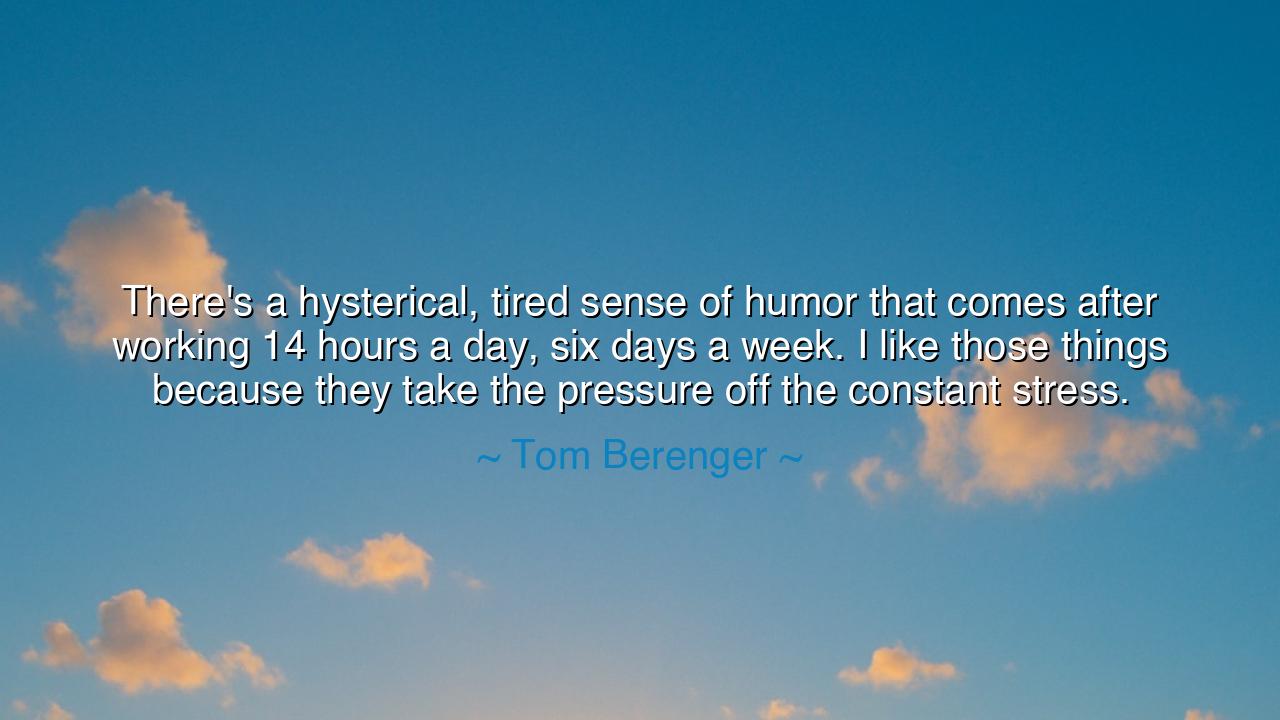
There's a hysterical, tired sense of humor that comes after
There's a hysterical, tired sense of humor that comes after working 14 hours a day, six days a week. I like those things because they take the pressure off the constant stress.






"There's a hysterical, tired sense of humor that comes after working 14 hours a day, six days a week. I like those things because they take the pressure off the constant stress." These words from Tom Berenger speak to the deep truth of human resilience and the healing power of humor in the face of relentless struggle. The humor he refers to is not the lighthearted, easy laughter that comes from comfort, but the cathartic release that arises after long hours of labor, exhaustion, and stress. It is the kind of humor born from survival, a lifeline that offers a brief respite from the grinding weight of daily work and the pressure of life’s demands. This kind of humor is not just a means of coping but a vital release—a way of processing the overwhelming burden of responsibility and finding momentary relief in the absurdities of life.
In the ancient world, humor was often seen as a gift from the gods, a tool for navigating the heavy burdens of human existence. The Greeks, particularly, celebrated the role of laughter in the face of hardship. Aristophanes, the famous playwright, understood that humor was not simply for entertainment, but for revelation—a way to cope with the struggles and contradictions of society. In his plays, laughter was often a means of exposing the flaws of the powerful and the foolishness of human nature, but it was also a way to offer the people relief from the oppressive weight of war, politics, and daily hardship. Similarly, Berenger’s view of humor as a release from stress mirrors this ancient tradition—humor is the balm that soothes the soul after the day’s battle.
Consider the life of Hercules, the great hero of Greek myth, who faced the Twelve Labors—impossible tasks that required not only strength but mental fortitude. In his journey, Hercules had to endure immense hardship, and in some stories, his humor and wit became essential tools for overcoming obstacles. Though he was tasked with monumental tasks, the lighter moments, the jokes shared with those around him, and the humor that arose from absurd situations were not just distractions, but acts of self-preservation. They allowed him to maintain his sanity, to keep moving forward when the weight of the world seemed unbearable. In much the same way, Berenger describes the humor that comes after working long, difficult hours—a release, a way to endure and continue despite the crushing pressure.
In the modern world, we see this type of humor in the lives of those who labor tirelessly to provide for their families and communities. Factory workers, farmers, and nurses, who often work long, grueling hours, find solace in moments of humor, even when exhaustion sets in. Take, for example, the story of Charlie Chaplin, whose character the Tramp embodied the resilience of the working-class hero. Despite his struggles and hardships, the Tramp’s wit and humor never failed him, even in the most difficult of situations. It was humor that allowed him to carry on despite overwhelming poverty and hardship. Chaplin’s ability to find laughter in his suffering was a testament to the strength of the human spirit and the deep need to cope with life’s burdens through lightness, even if only for a moment.
The hysterical, tired humor that Berenger speaks of is born of this same human need. After long hours of toil and sacrifice, there is a dark humor that allows us to see the absurdity in the very struggles that weigh us down. It is a way of saying, “Yes, this is difficult, but I can still find something to laugh about in the chaos.” It is survival humor, a way to push back against the crushing forces of responsibility, labor, and fatigue. This kind of humor allows the mind to escape the pressure, even if just for a moment, and to see life from a perspective that is both humorous and cathartic. It does not diminish the difficulty of the task at hand, but it provides a momentary release—a necessary breath that rejuvenates the spirit.
The lesson in Berenger’s words is one of resilience and the power of humor to transcend even the hardest moments. We are all faced with challenges in life—whether it be the daily grind, the pressures of responsibility, or the hardships of the world. But humor, especially the humor born from struggle, is a tool that we can use to survive and thrive. It is a way to step outside of the weight of our burdens and find a sense of freedom, even if only for a brief moment. Laughter in the face of hardship is not a denial of the difficulties we face, but an acknowledgment of our strength to continue despite them. In our most difficult moments, we must remember to find that spark of humor, that bit of levity that allows us to keep going.
So, dear listener, when life’s pressures begin to weigh you down, remember the wisdom of Tom Berenger. Embrace the humor that comes from exhaustion, from difficulty, and from the absurdity of life’s challenges. Know that in those moments of hysterical laughter lies the strength to keep moving forward. Let humor be your release—not as a denial of reality, but as a tool to maintain your sanity and balance amidst the storm. Like the ancient heroes, like Chaplin, and like Socrates, find the moments of lightness that sustain you and allow you to face the world with a smile, even when the weight of the world rests upon your shoulders.






AAdministratorAdministrator
Welcome, honored guests. Please leave a comment, we will respond soon